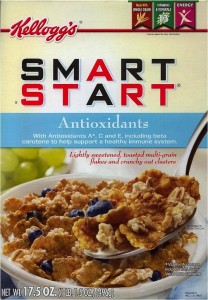European decisions on health claims: Vitamins, yes. Antioxidants, no.
Thanks to Anita Laser Reutersward in Sweden for forwarding the most recent decisions of the European Food Safety Authority (EFSA) on petitions for health claims.
Health claims are vitally important to food marketers. Evidence: they have filed 44,000 petitions with EFSA to date. EFSA consolidated these into 4,185 claims. It is dealing with them in batches.
EFSA did not approve many of the 416 petitions in this latest batch :
Experts issued unfavourable opinions on most of the claims in the second series due to the poor quality of the information provided to EFSA including:
- Lack of information to identify the substance on which the claim is based, e.g. “probiotics”
- Lack of evidence that the claimed effect is indeed beneficial to the maintenance or improvement of the functions of the body (e.g. food with “antioxidant properties”)
- Lack of human studies with reliable measures of the claimed health benefit
Its decisions about antioxidants are especially interesting in light of claims on products in American supermarkets. Under EFSA rules, this Kellogg package would not be allowed.
In its decision, EFSA said:
“On the basis of the data presented, the Panel concludes that a cause and effect relationship has not been established between the consumption of the food(s)/food constituent(s) evaluated in this opinion and (1) a beneficial physiological effect related to antioxidant activity, antioxidant content, or antioxidant properties, and (2) the protection of body cells and molecules such as DNA, proteins and lipids from oxidative damage.”
My translation: EFSA panels took a good hard look at the science and could not find evidence for benefits at the physiological or molecular levels from taking antioxidant supplements or eating foods with antioxidants.
I can’t wait to see how food manufacturers respond.
March 1 update: here come the comments. According to FoodNavigator.com, EFSA rejected health claims for:
vitamin D, probiotics, green tea, black tea, lutein, beta glucans, meso-zeaxanthin, alpha-lipoic acid, melatonin, peptides, xanthan gum, sugar-free gum, guar gum, gamma-linolenic acid (GLA), fermented whey and linoleic acid.
These decisions “came as a massive blow to the European and international functional foods and nutraceuticals industries, especially the herbal antioxidant and probiotic sectors, which have yet to see a positive NDA opinion.”


